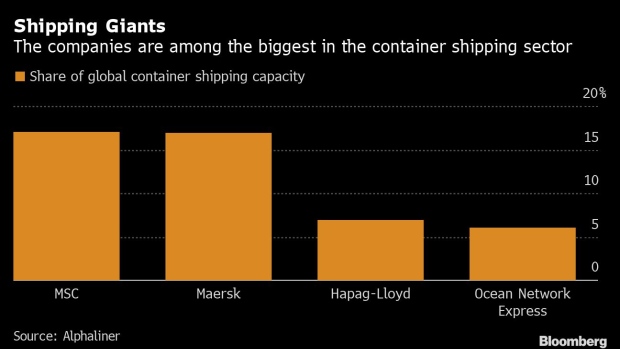Mar 1, 2022
Russia Gets Cut Off From World Trade as Shippers Halt Cargoes
, Bloomberg News

(Bloomberg) -- Almost half of the world’s container ships will no longer go to and from Russia, roiling trade in everything from food and metals to clothes and electronic goods.
Shipping giants A.P Moller-Maersk A/S and MSC Mediterranean Shipping Co. said they’re halting trade in the region, joining Hapag-Lloyd AG and Asia’s Ocean Network Express Pte in stopping services. They’re among the latest in a growing list of companies ceasing business with or exiting Russia following its invasion of Ukraine.
The moves threaten to pile more strain on exports of Russian goods -- as highlighted in surging prices of crucial commodities like aluminum. But it’s also leaving the nation increasingly isolated from world markets. Russian firms will have to find new ways to import commodities and other goods as well as shipping ship out raw materials, threatening even higher costs to consumers.
Maersk handles some shipments for aluminum giant United Co. Rusal International PJSC, and the suspension poses a risk to its exports, a person familiar with the matter said. Some shippers had already been refusing to transport Russian commodities such as nickel, but the impact on volumes so far has been minor, another person familiar with the matter has said.
Maersk, MSC, Hapag-Lloyd and One Network together account for about 47% of global container shipping capacity, according to Alphaliner. Russian exports and imports of containerized goods make up around 3% of world volumes, shipping data and analytics company Xeneta estimates.
The shipping companies’ decisions come as Ukraine’s ports are closed and traders are growing increasingly wary of booking cargoes out of Russia. That’s causing chaos in global crop trade and further pushing up grains futures at a time when world food prices are near a record.
For Russia, the suspensions will be a further blow to its economy and citizens’ living standards as imported goods risk becoming more scarce. Prices for some electronic goods have already spiked about 30% as the ruble slid, according to a Facebook post from the director of Russian electronics chain DNS.
“This means more for Russia than it does for world trade,” said Peter Sand, chief analyst at Xeneta. “It will impact the general public in Russia as well as companies.”
While Russia could potentially import goods by rail from China to soften the blow, that would take some time to set up, Sand said.
It’s not just in shipping markets for finished goods where Russia appears to be becoming isolated. Shipbrokers report that owners are wary of offering up their tankers to collect cargoes of Russian oil until its clear the country won’t be subject to further sanctions.
Two companies that run large fleets of tankers said they would be curbing their dealings with the country. Maersk Tankers, which manages 230 vessels, isn’t taking new business in Russia. And Torm Plc said it wouldn’t do new business with Russian ports.
©2022 Bloomberg L.P.


